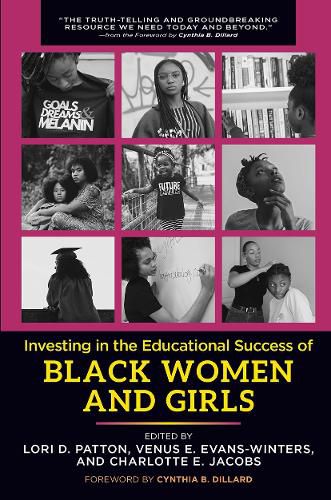Readings Newsletter
Become a Readings Member to make your shopping experience even easier.
Sign in or sign up for free!
You’re not far away from qualifying for FREE standard shipping within Australia
You’ve qualified for FREE standard shipping within Australia
The cart is loading…






While figures on Black women and girls’ degree attainment suggest that as a group they are achieving in society, the reality is that their experiences are far from monolithic, that the educational system from early on and through college imposes barriers and inequities, pushing many out of school, criminalizing their behavior, and leading to a high rate of incarceration.
The purpose of this book is to illuminate scholarship on Black women and girls throughout the educational pipeline. The contributors–all Black women educators, scholars, and advocates–name the challenges Black women and girls face while pursuing their education as well as offer implications and recommendations for practitioners, policymakers, teachers, and administrators to consider in ensuring the success of Black women and girls.
This book is divided into four sections, each identifying the barriers Black girls and women encounter at the stages of their education and offering strategies to promote their success and agency within and beyond educational contexts.
In Part One, the contributors explore the importance of mattering for Black girls in terms of redefining success and joy; centering Black girl literacy pedagogies that encourage them to thrive; examining how to make STEM more accessible to them; and recounting how Black girls’ emotions and emotional literacy can either disempower them or promote their sense of agency to navigate educational contexts.
Part Two uncovers the violence directed toward and the criminalization of Black women and girls, and how they are situated in educational and justice systems that collude to fail them. The contributors address incarceration and the process of rehabilitation and reentry; the outcomes of disciplinary action in schools on women who pursue college; and describe how the erasure and disregard of Black women and girls leaves them absent from the educational policies that deeply affect their lives and wellbeing.
Part Three focuses on how Black women are left to navigate without resources that could make their collegiate pathways smoother; covers how hair politics impact their acceptance in college leadership roles, particularly at HBCUs; illuminates the importance of social/emotional and mental health for Black undergraduate women and the lack of adequate resources; and explores how women with disabilities navigate higher education.
The final part of this book describes transformative approaches to supporting the educational needs of Black women and girls, including the use of a politicized ethic of care, intergenerational love and dialogue, and constructing communities, including digital environments, to ensure they thrive through their education and beyond.
$9.00 standard shipping within Australia
FREE standard shipping within Australia for orders over $100.00
Express & International shipping calculated at checkout
While figures on Black women and girls’ degree attainment suggest that as a group they are achieving in society, the reality is that their experiences are far from monolithic, that the educational system from early on and through college imposes barriers and inequities, pushing many out of school, criminalizing their behavior, and leading to a high rate of incarceration.
The purpose of this book is to illuminate scholarship on Black women and girls throughout the educational pipeline. The contributors–all Black women educators, scholars, and advocates–name the challenges Black women and girls face while pursuing their education as well as offer implications and recommendations for practitioners, policymakers, teachers, and administrators to consider in ensuring the success of Black women and girls.
This book is divided into four sections, each identifying the barriers Black girls and women encounter at the stages of their education and offering strategies to promote their success and agency within and beyond educational contexts.
In Part One, the contributors explore the importance of mattering for Black girls in terms of redefining success and joy; centering Black girl literacy pedagogies that encourage them to thrive; examining how to make STEM more accessible to them; and recounting how Black girls’ emotions and emotional literacy can either disempower them or promote their sense of agency to navigate educational contexts.
Part Two uncovers the violence directed toward and the criminalization of Black women and girls, and how they are situated in educational and justice systems that collude to fail them. The contributors address incarceration and the process of rehabilitation and reentry; the outcomes of disciplinary action in schools on women who pursue college; and describe how the erasure and disregard of Black women and girls leaves them absent from the educational policies that deeply affect their lives and wellbeing.
Part Three focuses on how Black women are left to navigate without resources that could make their collegiate pathways smoother; covers how hair politics impact their acceptance in college leadership roles, particularly at HBCUs; illuminates the importance of social/emotional and mental health for Black undergraduate women and the lack of adequate resources; and explores how women with disabilities navigate higher education.
The final part of this book describes transformative approaches to supporting the educational needs of Black women and girls, including the use of a politicized ethic of care, intergenerational love and dialogue, and constructing communities, including digital environments, to ensure they thrive through their education and beyond.